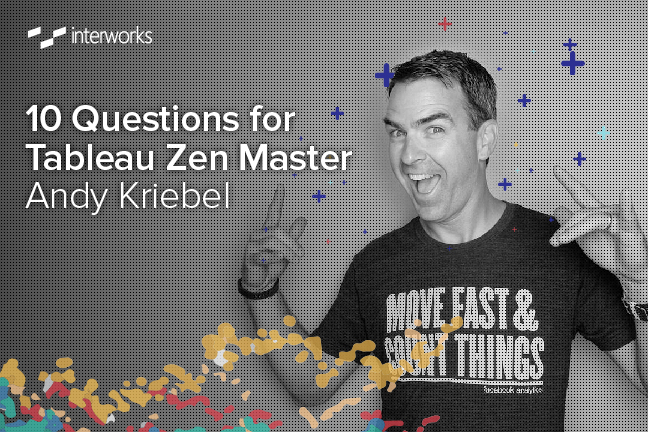10 Questions is an ongoing blog series in which Tableau Zen Master Dan Murray interviews some of the brightest folks in the world of data.

I met Tableau Zen Master Andy Kriebel at the first Tableau Customer Conference (2008) at the Edgewater Hotel in Seattle. Andy and I happened to sit next to each other at a meal, and we discovered that we both lived in Atlanta. Later that year, we started the first Tableau User Group in the world with some great folks from Norfolk Southern (John Hoover and Andy Piper) and UPS (Chris Cushman and Martin Click).
Today, Andy is the Data Visualization Guru at Facebook – and for good reason. He is a kindred spirit. He’s a natural ham and a natural speaker with the uncanny ability to insult people while smiling in a way that doesn’t anger them. He is one of my favorite people in the Tableau community, and his VizWiz blog is one of the most popular in the world of data visualization.
The Questions
Q: When did you first start using Tableau and why?
Kriebel: In 2007, I was working for Coca-Cola, and we were using Excel pivot tables against Microsoft Analysis Services cubes. This worked great for creating spreadsheets and getting exact answers, but it was a challenge to understand the overall picture.
At the same time, we were starting a new budget season, and the director of our group asked me to create dashboards that allowed us to track the progress teams were making with their budget planning against the goals they were given. I knew this was basically impossible with an Excel + cubes combination, so I did a Google search for dashboarding software, and Tableau was the first item in the search results.
I downloaded Tableau Desktop, installed it, watched a free training video, connected to our cubes and had my first working dashboard – all in the first hour. From there, I was hooked!
Q: Why do you blog?
Kriebel: I started my blog as a way to document what I was learning about Tableau and data visualization. Honestly, I started it for myself as a diary of my work so that I wouldn’t forget how I was doing things in Tableau. I also noticed that there were no other “Tableau” blogs. The Forums existed, but that was about it. Andy Cotgreave recently credited me with having the first Tableau blog, which is pretty cool! I had no idea!
Me: Actually, I had one before you. Mine wasn’t as good as yours, and I didn’t sustain the effort when I got busy with consulting work.
Kriebel: Shortly after I started the blog, people started commenting, asking questions and encouraging me. I was blown away by the interest. Now, I write as a way to give back. I want my blog to be a resource people look to for learning and understanding.
Lastly, I blog because I really enjoy writing. I used to run a technical writing team in Atlanta, and I learned so much from that team. It has helped me to become a better writer, and I learned how to enjoy it. I find it very therapeutic, especially when I’m stressed. Writing is a great release for me mentally.
Q: What did you do during your first year at Facebook? Where did you go?
Kriebel: My first year at Facebook was focused largely on evangelizing Tableau across the company. I would lead weekly training sessions and spend a lot of 1:1 time with users, monitoring our Facebook group and answering questions. I conducted training at our main campus in Menlo Park and in several of our remote offices: Austin, New York, Hyderabad, London and Dublin. It’s been so much fun introducing Tableau to people and seeing how much easier it was making their jobs.
Q: What do you see happening in the Tableau world in the next few years?
Kriebel: I can’t see Tableau becoming anything short of much larger. There’s such a need to make data analysis easy in corporations, and no tool meets that need quite the way that Tableau does.
I feel Europe is ripe for growth, and I think Tableau made a big statement regarding intent when they relocated CEO, Christian Chabot, to London. I also base this on my experience at the last two Customer Conferences in London. They felt very much like the early Tableau conferences in the US. They had that great vibe that every Tableau conference has but with the additional enthusiasm that you get from people that are experiencing Tableau for the first time.
Q: What’s the number one feature you would like to see added to Tableau?
Kriebel: This is a no brainer … dynamic parameters!
Q: Where do you get your ideas for blog posts and visualizations?
Kriebel: Many of my “Tableau Tips” blog posts come from things I have learned at work either on my own projects of from helping our users.
The new “Makeover Monday” series has turned out to be quite popular. I occasionally get emails from people with suggestions for makeovers, which I really appreciate. Generally though, most of these ideas come from blog posts I read. I use Feedly as my RSS reader. I used to keep a list of makeovers in Evernote, but I was recently introduced to Pocket by Andy Cotgreave, and I like how I can save posts from Feedly into Pocket and tag them as makeover candidates.
This previous Thanksgiving, I started a new blog, datavizdoneright.com, in which I highlight great visualizations from around the web. These ideas come from Feedly, and I save vizzes I want to post in Pocket. I started this blog after listening to the “Tableau Wannabe Podcast” when Andy Cotgreave was the guest. They talked about how it’s easy to write critiques, but there wasn’t really anyone highlighting good work. The night I listened to it, I started the site.
Q: What are your thoughts on data discovery with Tableau?
Kriebel: Great question! What I tend to see is that people start using Tableau as a dashboarding tool, but the real power in Tableau is the data discovery. I’ve spoken at several Tableau conferences about how I used Tableau in this way and the impact it had on Coca-Cola. The speed to insight is unmatched with any other tool.
In fact, these are my favorite training classes to run. I arrive at the room, ask the class for a data set or project they are working on (keep in mind that these are data sets I’ve never seen), then I show them how to connect to the data and use Tableau to ask and answer questions. It’s absolutely the best way to see quick ROI with Tableau.
Q: What are some of the best resources (blogs) you’ve seen for learning more about data visualization and Tableau?
Kriebel: On my blog, I have a page that lists all of the blogs I follow. For Tableau, people should follow all of the Zen Masters, Tableau’s blogs and partners like InterWorks and The Information Lab. These folks know what they’re doing. By no means are these the only people/companies you should follow.
To learn about data visualization, I recommend people follow Stephen Few, Alberto Cairo, Andy Kirk, Cole Nussbaumer, Visual.ly and many others. These can also be found on my blog roll.
Q: How do you see data visualization tools changing/improving over the next five years?
Kriebel: As computers become faster, the tools we use will become faster as well. It’s going to be interesting to see how tools begin to integrate and how vendors make them easier to use. The way people use devices today, people expect intuitiveness. Our data viz tools will be expected to be intuitive to use as well.
Q: What dashboard designs annoy you more than inspire you?
Kriebel: Nothing annoys me more than dashboards that are intentionally misleading. Poor designs are one thing, but when people intentionally deceive readers, that’s just not right. When I teach data viz classes, I go through many examples of misleading visualizations. I’ve found that people tend to learn better what not to do by evaluating bad work. So, my data viz workshops will focus on doing makeovers in class with markers and paper; we don’t use any software.
Discover More Interviews
Want to read more insightful interviews like this one? Then you’ll love our 10 Questions blog series. Check out the full list of interviews here, and stay tuned for new additions.
Need Help? Let Us Know!
There you have it. If you need help with your data infrastructure or Tableau, we have the experience, skill, and knowledge to insure your success. Contact us today to learn more.
If you’re in college and think you might want to get into this game, head to our Careers page and apply for one of our open jobs. We’d love to hear from you.

